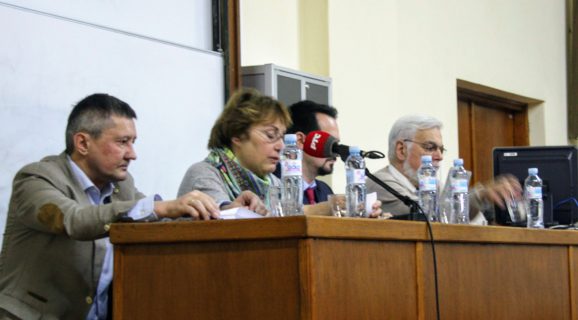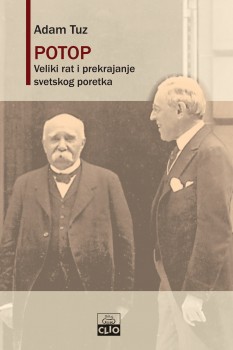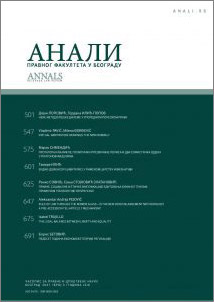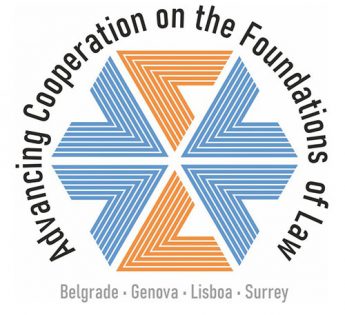
Discussion on the book of Adam Tooze, “The Deluge: The Great War, America and the Remaking of the Global Order, 1916–1931”
The University of Belgrade Faculty of Law hosted a promotion of the Serbian edition of Adam Tooze’s book “The Deluge: The Great War, America and the Remaking of the Global Order, 1916–1931”. The translation of the book into Serbian was published by the „Klio“ publishing house. The event was held on March 3, 2020. The discussants of the book were Smilja Marjanović Dušanić, professor at the University of Belgrade Faculty of Philosophy, and from the Faculty of Law, the Dean, Prof. Dr Zoran Mirković, Prof. Dr Tanasije Marinković, and Prof. Dr Boris Begović.
 Professor Marjanović Dušanić opened the discussion expressing her gratitude to the publishing house “Klio” for publishing the translation of the book, as well as to the host of the event. In her view, the hundred years’ anniversary of the Treaty of Versailles is a perfect occasion to discuss political, economic and legal consequences of the new world order. Adam Tooze’s book, in her words, gives an original and scientifically grounded view of the changes in the world that emerged as a legacy of the Great War and the rise of American economic and military power. Professor Marjanović Dušanić introduced some of the central ideas of the book and praised the fact that discussants are very knowledgable about the topic.
Professor Marjanović Dušanić opened the discussion expressing her gratitude to the publishing house “Klio” for publishing the translation of the book, as well as to the host of the event. In her view, the hundred years’ anniversary of the Treaty of Versailles is a perfect occasion to discuss political, economic and legal consequences of the new world order. Adam Tooze’s book, in her words, gives an original and scientifically grounded view of the changes in the world that emerged as a legacy of the Great War and the rise of American economic and military power. Professor Marjanović Dušanić introduced some of the central ideas of the book and praised the fact that discussants are very knowledgable about the topic.
Professor Mirković emphasized that the deluge of the Great War led to a deep change of the world order in which Europe lost its historical leadership. The peace established after the Great War was Pax Americana, whereas Russia was left on the margins due to the October Revolution. He highlighted that the Paris Peace Conference was merely the first step in establishing peace in Europe. In his words, Adam Tooze clearly demonstrates that this process continued by several subsequent modifications of political and economic conditions imposed on Germany in the Treaty of Versailles. Professor Mirković concluded that the period between the two wars is far from homogenous, whereas Adam Tooze put emphasis on the years following the Great War. In the times to come, Germany and the Soviet Union become stronger, setting the stage for the new war.
Professor Marinković began his presentation by referring to Tooze’s insight that, in relation to World War I, nothing developed as planned. He analyzed the consequences of the Great War on international and domestic law. In his view, the consequences of World War I should be considered from a broader historical perspective. When it comes to international law, it was the Peace of Westphalia that shaped European relations and European politics until the First World War. The Treaty of Versailles marked a turning point in international relations by establishing the League of Nations. The organization was supposed to regulate relationships between states and subordinate their unconstrained sovereignty to the principles of peace and solidary among nations, even though it did not completely ban the right to war. Consequences were substantial for national states and legal order i.e. the fall of the four empires, the establishment of republic states and the adoption of modern constitutions. Professor Marinković concluded that, as it would be shown later on, it would take a long time for the newly created states to build liberal-democratic values embedded in those constitutions.
In his presentation, Professor Begović addressed two central questions in Adam Tooze’s book. What is the cause of the US economic boom? What are the consequences of this boom for the world order? In response to the former question, he analyzed political, economic, and military opportunities at that time. He highlighted the US success in the Second Industrial Revolution as well as the unseen technological advances they achieved. Among other reasons that contributed to the US boom, he highlighted the key financial and political role that the US had in ending the Great War as well as the often neglected personality of Woodrow Wilson. In response to the second question, Professor Begović stated that peace after the Great War was based on a compromise, the so-called „peace without a defeated“ that did not lead to the unconditional capitulation of Germany. The treaty of Versailles did not resolve many of the substantial issues of the time, which left the world order fragile and unstable.




